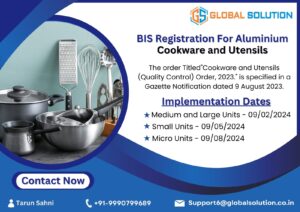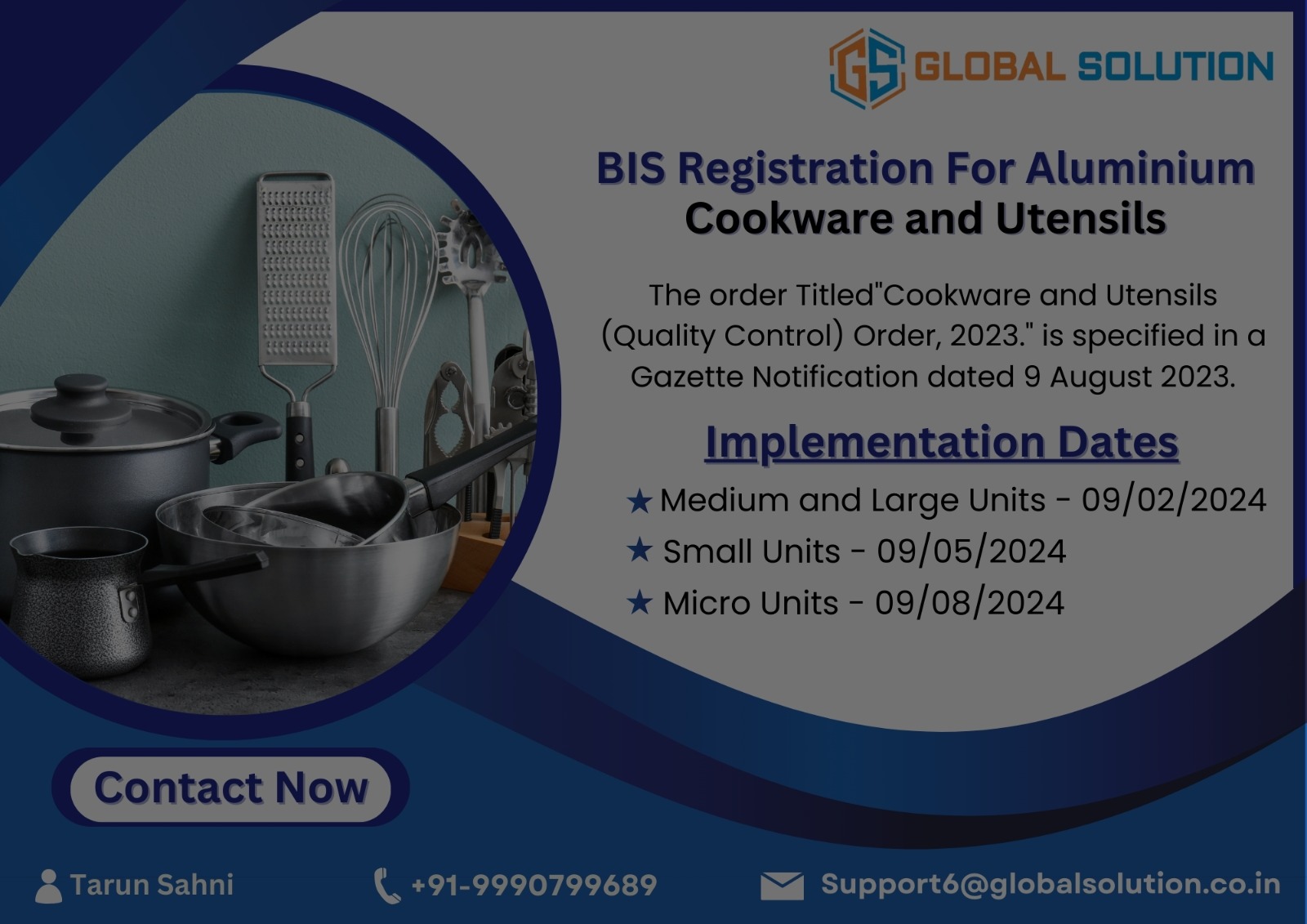About Us:
Welcome to Global Solution, a distinguished BIS Consulting company with extensive expertise and deep industry knowledge. Our commitment is to provide comprehensive solutions in compliance with Bureau of Indian Standards (BIS) regulations. With a wealth of experience, we navigate the complexities of quality standards, ensuring your business thrives in adherence to the highest industry benchmarks. Partner with us for unparalleled BIS compliance services and unlock a world of quality assurance and regulatory excellence.
BIS Certification for Cookware and Utensils
BIS, India’s standardization authority, ensures product quality through stringent benchmarks. Quality Control Orders (QCOs), mandated by government bodies, enforce specific standards in various industries. Adherence to QCOs involves obtaining BIS certification, fostering consumer trust and fair market competition. This dynamic ensures a marketplace where product quality and safety take precedence.
- Order Details: The Quality Control Order is titled “Cookware and Utensils (Quality Control) Order, 2023.”
- Issuing Authority: Ministry of Commerce and Industry.
- Standards: The order specifies adherence to various Indian Standards, including 14756:2022, 1660:2009, 13983:1994, 9396 (Part 1): 1987, 14407:1996.
- Standard Mark: Cookware & Utensils must carry the Standard Mark under a Bureau of Indian Standards (BIS) license as per Scheme-1 of the Bureau of Indian Standards (Conformity Assessment) Regulations, 2018.
- Gazette Notification: The order is specified in a Gazette Notification dated 9 August, 2023.
- Effective Date: The order becomes effective after six months from the notification date. However, there are different timelines for Micro and Small Enterprises under the Micro, Small and Medium Enterprises Development Act, 2006: nine months for Small Enterprises and twelve months for Micro Enterprises.
Subsequent to the effective date of the Quality Control Order, the manufacturing, importing, and selling of goods falling under the specified QCO, without BIS Registration, is deemed unlawful, and contravention of this requirement may result in legal repercussions.

BIS Registration Process for Domestic Manufacturers (Simplified Procedure)
Step 1: Preparing Documentation
Gather essential documents, including product drawings, technical specifications, manufacturing process details, and quality control procedures.
Step 2: Pre-testing of Samples as per Grouping Guidelines
Grouping our products as per the Product Manual issued by BIS and Testing the samples from BIS Approved Laboratory.
Step 3: Application Submission
Prepare and submit the BIS application form along with the required documentation and test report to the BIS Regional Office or Branch Office. Ensure accuracy and completeness in the application.
Step 4: Preliminary Factory Inspection
Upon application acceptance, the BIS shall conduct a preliminary inspection of the manufacturing facility. Ensure that the production process adheres to the specified standards. Performance of In-house Factory Testing.
Step 5: Sample Testing for Verification
Testing of any 1 sample from Grouping Guidelines as prepared in Step 2 for Verification Purpose.
Step 6: Grant of Registration
BIS issues the registration certificate after the successful verification. This officially certifies the product’s compliance.
Step 7: Marking Products
Mark the certified products with the BIS Standard Mark as per the specified guidelines. This mark signifies adherence to quality standards.
Step 8: Post-Certification Surveillance
Participate in post-certification surveillance activities conducted by BIS to ensure ongoing compliance. This may include periodic factory inspections and sample testing.
Step 9: Renewal of Certification
Monitor the certification’s expiry date and initiate the renewal process well in advance to avoid disruptions in product manufacturing and sales.
Note:
– The simplified procedure aims to streamline the BIS registration process for domestic manufacturers.
– It is essential to stay updated with any changes in BIS standards and procedures to maintain continuous compliance.
BIS Registration Process for Foreign Manufacturers (Normal Procedure)
Step 1: Initial Application Submission
Submit an application along with necessary documents, including details about the foreign manufacturing facility and the intended product for registration.
Step 2: Appointment of Authorized Indian Representative
Foreign manufacturers must appoint an Authorized Indian Representative (AIR) who will act on their behalf throughout the registration process. The AIR should be a legal entity in India with the capability to represent the foreign manufacturer.
Step 3: Application Scrutiny and Nomination of Inspecting Officer
After the application review, BIS will intimate the applicant for queries in the application, if required and an Inspecting Officer will be appointed by BIS for Foreign Inspection.
Step 4: Factory Inspection
BIS shall conduct an inspection of the foreign manufacturing facility to ensure compliance with quality standards. The AIR facilitates coordination and communication between the foreign manufacturer and BIS during this process.
Step 5: Product Testing
After the inspection, BIS shall require product samples for testing. These samples must be sent to BIS-recognized laboratories for evaluation against the relevant Indian Standards.
Step 6: Grant of BIS Registration
Upon successful completion of testing and factory inspection, BIS issues the registration certificate. The foreign manufacturer can then mark their products with the BIS Standard Mark, indicating compliance with Indian quality standards.
Step 7: Submission of Agreement, Indemnity Bond and Bank Guarantee
The manufacturer needs to submit Agreement, Indemnity Bond and Bank Guarantee of 10,000 USD to BIS in the prescribed format given by BIS on their official website.
Step 8: Compliance Assurance
Maintain ongoing compliance with BIS standards. The foreign manufacturer should keep the BIS informed of any changes in manufacturing processes, product specifications, or contact details.
Step 9: Post-Certification Surveillance
Participate in post-certification surveillance activities conducted by BIS to ensure ongoing compliance. This may include periodic factory inspections and sample testing.
Step 10: Renewal of Certification
Monitor the certification’s expiry date and initiate the renewal process well in advance to avoid disruptions in product manufacturing and sale.
Note:
– The Normal Procedure involves a thorough evaluation of both the product and the manufacturing facility.
– Collaboration with the Authorized Indian Representative is crucial for effective communication and coordination with BIS.
– Staying informed about updates to BIS standards and regulations is essential to ensure continuous compliance.
Why Choose Global Solution?
- Expertise You Can Trust: With years of industry experience, we bring a wealth of expertise to navigate the complexities of BIS regulations and ensure your compliance journey is smooth and reliable.
- Tailored Solutions: We understand that every business is unique. Our personalized approach ensures that our BIS consulting services are tailored to meet your specific needs, providing comprehensive and effective solutions.
- Timely and Efficient: At Global Solution, we value your time. Our team is dedicated to delivering timely and efficient BIS registration services, minimizing hassles and maximizing your peace of mind.
- Commitment to Quality: We are committed to upholding the highest standards of quality and excellence in our services. Trust us to guide your business towards BIS compliance with precision and dedication.
Choose Global Solution for a partner who not only understands your compliance needs but also strives to exceed your expectations.”


